Thousands of people have staged a protest in Isfahan, Iran’s top tourist destination, demanding authorities bring to an end a spate of acid attacks on young women that has sparked horror and outrage.
Assailants riding on motorbikes, in a similar sequence of events, have thrown acid in the face of at least eight women who were driving in the street with their windows pulled down. Local media say the number of victims could be higher. The attacks have so far claimed one life, an opposition website said.
Many Iranians believe that victims were targeted because they were women wearing clothes that could be deemed inappropriate in the eyes of hardliners – a claim vehemently denied by the authorities.
Isfahani citizens, horrified by the scale of vicious assaults, gathered in front of the city’s justice department on Wednesday, calling on the authorities to put an end to the crimes which has highlighted the striking challenges women face in Iran, where hijab is obligatory.
A number of protesters in Isfahan chanted slogans that described the attackers as Iran’s own version of Isis, the extremist group that has committed many atrocities in Iraq and Syria.
“Stop violence against women,” read a placard held by female protester, according to images posted on Twitter. “Freedom and security are the rights of Iranian women,” demonstrators chanted in Isfahan’s Nikbakht Sstreet. Iran’s semi-official Fars news agency estimated the number of the participants to be around 2,000. After a few hours, local police was reported to have dispersed the crowd.
In Tehran, dozens of people showed solidarity with the victims in Isfahan by staging a similar but smaller gathering in front of the Iranian parliament (Majlis), calling on MPs to halt a bill which gives more freedom to the morality police and plainclothes militia in their crackdown on women with “bad hijab”.
“Isfahan doesn’t want Daesh (Isis), stop acid attacks,” Tehranis chanted, according to the opposition website, Saham News.
Women in Iran are required by law to be covered from head to toe but many defy the regulations by revealing their stylish hair or pushing the boundaries. In response, the morality police are regularly deployed in big squares and at public buildings cautioning women and asking them to bring their headscarves forward.
Earlier this week, Iranian MPs considered a bill which prohibits the use of violence in the hijab crackdown but at the same time gives more leeway to the relevant officials.
Nasrin Sotoudeh, a leading Iranian human rights activist, told the Guardian on the phone from Tehran that she was among the protesters in the capital.
“How can you live in the society and remain indifferent towards such horrible attacks,” she said. “We are opposed to the parliamentary bill. If it is implemented, those who engage in violence against women will certainly feel that they have protection.”
Sotoudeh said the riot police interfered with the protest in Tehran, attended by some 300 Iranians, and confiscated a number of cameras belonging to photographers or activists. “The authorities are worried about women’s hijab but what is more important than people’s security?” she asked.
Iran’s police chief, Esmail Ahmadi-Moghaddam, confirmed on Wednesday that around seven to eight people had been targeted in Isfahan. “Acid attacks are reprehensible and repugnant,” he said, according to Fars. “This crime is even worse than murder.”
He said a number of suspects had been locked up but motives behind the attacks had not yet come to light. “According to the victims, there has been only one attacker and we are pursuing efforts to identify him,” said the police chief.
In the face of the assaults, Iranian officials have gone on the offensive, scrambling to deny that their long-standing policy of cracking down on women not wearing the hijab has contributed to the Isfahan incidents. “We are still unsure about the attacker’s motives but some foreign and opposition media organisations have linked the attacks to the issue of hijab and women’s covering,” he said. “This is not true and those attacked were from faithful families.”
On Wednesday, Iran’s health minister, Seyed Hassan Hashemi, an ophthalmologist, visited one of the victims, the 27-year-old Soheila Jorkesh, who is being treated in Tehran’s Shahid Shiroudi hospital.
Jorkesh, who had her disfigured face concealed behind bandages, was pictured by photographers as Hashemi examined her eyes. “She has lost sight in her right eye and her left eye needs further treatment,” the minister was quoted as saying. She was also severely burnt on other parts of her body.
“I was coming back from the swimming pool and pulled over in Bozorgmehr Street so that my friend could get out. That’s when it all happened,” she was quoted as saying. “I took off all my clothes and threw them on the ground. People gathered in a circle but no one helped to wash my body, everyone was throwing back clothes on me so that my body would not be naked.”
The acid attacks dominated Wednesday’s front pages in Iran. “It is confirmed that the attacks were serial crimes,” read the headline of the reformist Shargh daily. The newspaper said the same type of acid had been used in all cases.
Iranian officials, wary of the significant media coverage inside the country, have warned reporters against spreading fear inside the society. The authorities are particularly irked by any suggestion that the victims were selected due to their hijab.
“Some people insinuate that victims had inappropriate hijab but we cannot confirm these claims. One of the victims was actually from a very religious family,” said a judiciary official, according to Shargh.
Mohammad-Reza Naghdi, the head of the informal voluntary Basij militia, said western media were linking the attacks to the hijab issue, trying to distort the image of Islam. In his view, “western intelligence services” were behind the attacks.
Iran’s justice minister, Mostafa Pourmohammadi, has described the Isfahan assaults as terrorist attacks intended to sabotage the city’s safety. “We are very concerned and are doing all our best to bring those responsible to justice,” he was quoted as saying.
Shargh said the incident had already affected Isfahan’s tourist industry. “Some foreign tourists have since asked us if they would be attacked by acid if their headscarves were pushed back and we had to reassure them that this will not happen,” said one hotel operator. Another said: “Those responsible for these attacks want to harm the city’s tourist industry.”
Acid attacks in Iran are usually linked to personal grudges. In 2011, the case of an Iranian woman who was blinded when a spurned suitor threw acid at her drew international attention.
The man who blinded Ameneh Bahrami, in a literal application of the Sharia law of an eye for an eye, was due to be blinded with acid himself. But at the last minute, as Majid Movahedi was due to be rendered unconscious and lose his sight, Bahrami pardoned the assailant in a move that prompted praise at home and abroad.
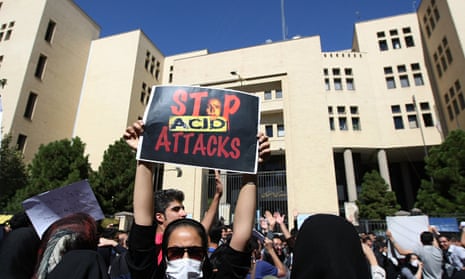
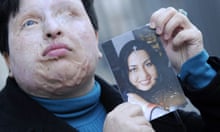


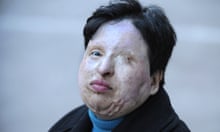
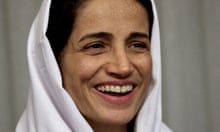
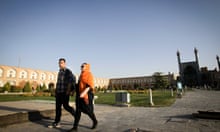
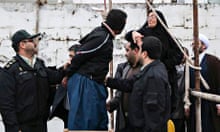

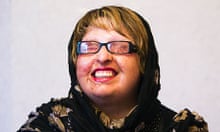

Comments (…)
Sign in or create your Guardian account to join the discussion